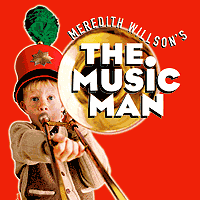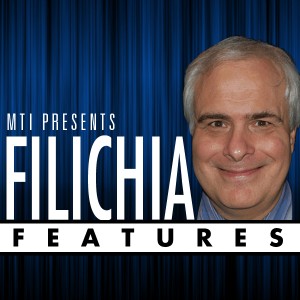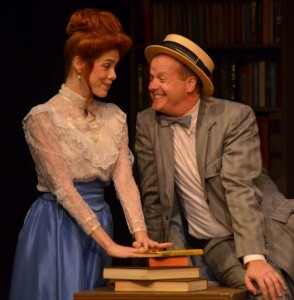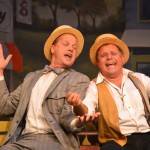Filichia Features: 76 Trombones and 80 Years
Filichia Features: 76 Trombones and 80 Years
 What’s the most famous story concerning The Music Man?
What’s the most famous story concerning The Music Man?
That it beat West Side Story for the Best Musical Tony?
That it made an A-grade star of B-level movie performer Robert Preston?
Or is it the one that tells what happened midway through Act One on opening night in 1957?
Preston and company were doing this marvelous new song called "76 Trombones." The audience was so entranced by it that right in the middle plenty of people started rhythmically clapping in unison.
Today, this type of clapping is rather common – because so many performers demand it. We’ve all seen a singer storming down to the footlights, staring at the audience, putting his arms high above his head, clapping loudly in rhythm and nodding as if to say, "Okay -- now clap!"
Believe me, Preston didn’t need to do that. The first-nighters at the Majestic Theatre clapped simply because they adored this new catchy song.
Last week at the Bergen County Players in Oradell, New Jersey, the crowd did that 1957 opening night audience one better. Most everyone started clapping in unison four seconds into the show, as soon as the overture reached "76 Trombones."
Granted, some of this excitement came from the theater’s marking its 80th anniversary of continuous operation. But don’t underestimate the crowd’s sky-high spirits in hearing this great song and knowing that they were about to see The Music Man -- that great All-American musical.
How nice that their early faith was not diminished a whit as the performance continued. Director Larry Landsman did a terrific job in casting all 39 performers in the roles they seemed born and destined to perform. The enchanting Sarah McIlroy as piano student Amaryllis didn’t have to have a pianist in the pit take over when she had to play her lessons; the kid provided her own.
We all knew we were in safe hands during the “opening number.” I use quotation marks because "Rock Island" is not a true song with real notes. And yet, it’s a patter-piece with a musicality all its own, for composer-lyricist Meredith Willson had an inspired notion:eight traveling salesmen on a train speak in time to the rumble of the train tracks.
How superbly the eight did here, never missing a beat, hitting every syllable as they were supposed to. Landsman must have worked with them morning, noon, afternoon and night to get such a letter-perfect rendition. The audience now could relax: if such a demanding piece could be conquered in such lickety-split fashion, the rest of the production would be in equally excellent shape.
John Ade (center) as Harold Hill in Bergen County Players' production of The Music Man
That brings us to John Ade as Harold Hill. How wise he and Landsman were to avoid a photocopy of Robert Preston’s Tony-winning performance. Too many actors listen to the cast album and/or look at the 1962 film, and feel that if this is the way Preston did it, well, it’s the only way to do it.
It’s not. This will strike some as heresy, but wasn’t Preston just a little bit too slick to be believed -- even in River City, Iowa in 1912?
John Ade wasn’t. He had a quiet charm and a grin that could pass for genuine. He didn’t overdo “Ya Got Trouble,” in which he warned the townspeople of “the caliber of disaster indicated by the presence of a pool hall.” Ade simply let what he perceived as the facts speak for themselves: “River City’s gotta have a boys’ band.”
There ought to be a law that all the actors who plan to play Harold should see Ade – not so that they can replicate his performance, of course, but so they’d have the confidence to forge their own Harolds that borrow nothing from Preston (or Craig Bierko, who borrowed shamelessly from Preston in the 2000 revival).
Landsman was equally lucky with his Marian Paroo, River City’s piano teacher-cum-librarian. Katie Weigl showed contempt that Harold didn’t know a G-clef from a cleft chin. She expressed her desire for a true man in two solos that truly tax a soprano. Weigl showed that the stratospheric notes can be finessed.
John Ade as Harold Hill and Katie Weigl as Marian Paroo in Bergen County Players' production of The Music Man
What made Weigl a superior Marian was her slight tinge of world-weariness. The actress reminded us that she was playing a single woman who must be the sole provider for her widowed mother and little brother Winthrop. Weigl was firm but not cruel with Ade when she told him, “My brother is a ten-year-old problem child who can’t understand why his father was taken away.” And she didn’t even mention the kid’s other great challenge: Winthrop has always been mortified that he speaks with a lisp.
In Moonstruck, Ronny Cammareri says he was “a dead man” before he fell in love with Loretta Castorini. What’s substantially sadder is seeing a dead kid – which Justin Landsman played to perfection. Yes, he’s the director’s son, but if anyone thought that nepotism was at work here, he’d only have to hear the astonishing amount of applause the kid received after delivering a charming“Gary, Indiana.”
This of course happened after one of the greatest first-act curtains in musical theater history. After we’d watched Winthrop be miserably unhappy for an hour-and-a-half, he suddenly came alive because he was excited to be part of a band.
And that’s why his sister fell in love with Harold. Finally, someone found how to unlock the lad’s heart and made him come alive. Although Marian had been ready to provide Mayor Shinn with a book that would prove that Harold was a phony, she suddenly ripped out the incriminating page. And for a librarian to deface a book!
The Mayor may seem a small part, especially because he doesn't sing a note. And yet, this role won David Burns a Best Featured Actor in a Musical Tony. Still, any performer must be adept at trying to deliver the Gettysburg Address and failing about four score and seven times. Rob Kopil had the right amount of bluster.
(l-r) John Ade as Harold Hill and Jimmy Vinetti as Marcellus Washburn in Bergen County Players' production of The Music Man
Jimmy Vinetti gave a fresh interpretation to Marcellus, who had once been Harold’s right-hand con man until he came to River City and went straight. But Vinetti’s sparkling eyes and impish smile showed a Marcellus who was again intent on helping Harold and was delighted to be back in the con game.
Andrew Van Buskirk was a fine Tommy Djilas, the quasi-juvenile delinquent who threw a firecracker at Eulalie Mackecknie Shinn, the mayor’s wife, while she was performing. (Everybody's a critic!) Janica Carpenter, who’d adeptly played the character’s pretentiousness up till then, roared a brass-tacks “Someone shot me!” that let us see the character’s true dark colors.
Tommy’s an important character, for he proves that if someone believes in a so-called bad boy and gives him responsibility – as Harold does – the lad will quickly change into a good one.
Want another way of doing it? Cast a kid in a show.
(l-r) Justin Landsman as Winthrop and Paula O'Brien as Mrs. Paroo in Bergen County Players' production of The Music Man
That brings us to one of The Music Man’s greatest strengths: it’s an excellent multigenerational show. What a pleasure to see late middle-aged performers mingling with kids who weren’t even around when the new millennium began. From the interaction they showed in Oradell, I’ll bet that most everyone had come to care about each other and learned a good deal from each other. Age barriers were probably blown apart with the force of a Tommy Djilas firecracker.
Explosive, too, was the audience response after “Marian the Librarian.” That original choreographer Onna White made a dance in a library a soft-shoe was inspired, but White did err in the way she treated Marian during this number: she had Marian momentarily forget herself, get swept away, and start dancing. No. Marian must stay rigid until her brother finds happiness. Only then can she start concentrating on herself. So brava to choreographer Vanessa Garrabrant for not replicating this utterly wrong moment.
Weigl and Ade did quite well by one of musical theater’s best dialogue exchanges. After Marian pointed out that she doubted Harold because “One hears rumors of traveling salesmen,” he responded, “One even hears rumors about librarians.” Checkmate! Harold has learned from the locals that Marian had consorted with the town’s richest man. If he’d grandly overlook her indiscretion, shouldn’t she in turn overlook his?
But the clock runs out on Harold, and he’s brought to justice. Shinn roared “If there’s a person in this hall who does not think this man should be tarred and feathered, let him stand up.” One by one, River Citizians stood –- and as each did, we had to admit, yeah, Harold did help this one and that one, too. All right, there won’t be much of a boys’ band, but he did bring a certain type of music into most everyone’s life.
More to the point, Harold gave the River City kids something to do. Do the same for the kids in your town. The Music Man reiterates that the arts can include everyone and change a community. And while Harold warns Marian of having “a lot of empty yesterdays,” the Bergen County Players – and your group – will have some wonderful "future yesterdays" when they reflect on the joys they had in performing The Music Man.
 You may e-mail Peter at pfilichia@aol.com. Check out his weekly column each Tuesday at www.masterworksbroadway.com and each Friday at www.kritzerland.com. His newest book, Broadway Musical MVPs, 1960-2010: The Most Valuable Players of the Past 50 Seasons, is now available through Applause Books and at www.amazon.com.
You may e-mail Peter at pfilichia@aol.com. Check out his weekly column each Tuesday at www.masterworksbroadway.com and each Friday at www.kritzerland.com. His newest book, Broadway Musical MVPs, 1960-2010: The Most Valuable Players of the Past 50 Seasons, is now available through Applause Books and at www.amazon.com.





























